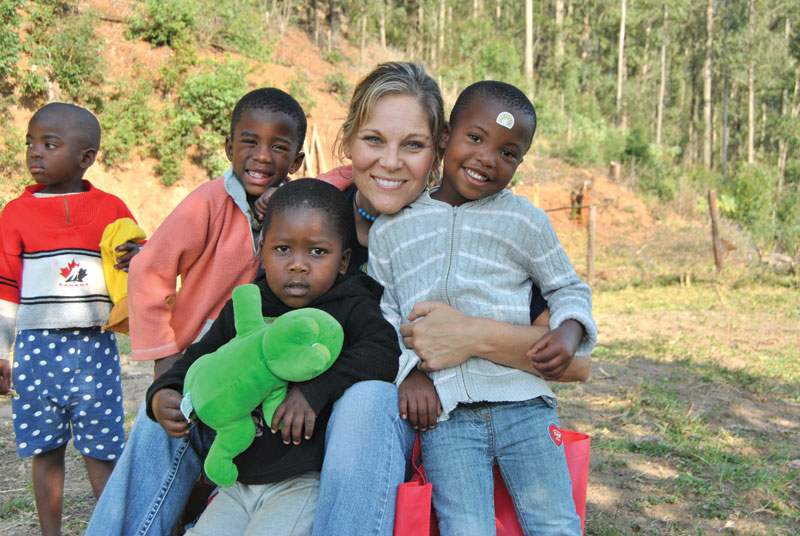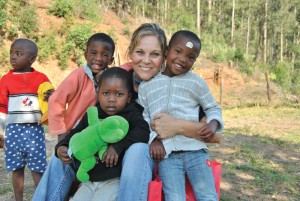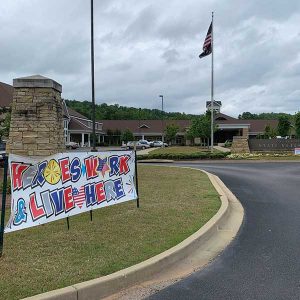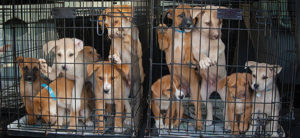
Christy Minor follows in her grandparents’ footsteps
 Story by Carol Pappas
Story by Carol Pappas
Photos by Michael Callahan
Submitted photos by Christy Minor
It’s a legacy of mission work that has taken Christy Church Minor halfway around the world and back again — six times. But it’s a calling to a continent she seems to have been destined to fulfill.
Her grandparents Clyde and Anneli Dotson were missionaries in Africa for 40 years. Her mother, Margaret, grew up as the daughter of those missionary parents in Rhodesia. And although Minor is a judge’s wife, a mother of two and an elementary school librarian in Pell City, Alabama, Africa has become a place that beckons her every summer.
Fresh from a mission trip to Swaziland, a tiny country in South Africa, Minor shares her experience from the comfort of Coosa Valley Elementary’s library, surrounded by Pell City children eager to hear her story about this faraway land.
A month earlier, she was wrapped nearly head to toe with the warmest clothes she could find. It’s winter there while Alabama children swelter in the heat of the summer sun. As a member of the Pell City First Baptist Church mission team, her work at an orphanage in Bulembu was getting its library in order in a building with no heat.
By the end of the week, neat shelves packed with books in orderly fashion replaced the titanic piles of books strewn about the floor that Minor had encountered upon arrival. She went through them all, discarding what wasn’t needed or was out of date and then transformed it into a real, usable library. “They were very happy to have a librarian,” she notes.
And just like she does on a regular basis at Coosa Valley, she would read to the children of Bulembu. Their favorite, just like back home, was “No, David!” And as Minor recounts to the Coosa Valley children about sharing the children’s book with their counterparts a world away, the look of familiarity is evident in their faces.
While where she was in Bulembu was an orphanage, careful attention is given to avoid the stigma of children with no family. They live in individual homes with “aunties” caring for them. She lived in one of the nearby homes, visiting the children each afternoon after school and working with them. She , too, became known as “Auntie Christy,” she tells her students in the best South African accent she can muster.
But by the end of the week, when the Bulembu children would see her on the playground, they reminded her of the joy they found in what they learned from the book she had shared. If imitation is the best form of flattery, they certainly discovered it. They would smile, hold up a single finger and say, “No, David!” to her as she passed.
Bulembu is actually a real-life lesson to be learned in and of itself. It was a deserted mining town bought by the not-for-profit Bulembu Ministries Swaziland just seven years ago. Swaziland fell victim to the AIDS pandemic and has the highest incidence in the world of this deadly disease. As a result, thousands of children have been left orphaned.
Bulembu, in which Global Teen Challenge plays a major role, was created with a vision to make it self-sustaining to give those children a chance to rise above the abject poverty that has controlled their region for generations. And it’s working. It is now 30 percent self-sustainable through a dairy operation, bottling honey, a bakery, a water bottling plant and timber sales.
“It is very encouraging,” Minor says. Teachers come from all over the world. “They said, ‘We just came here for a few months’ ” and seven years later, they’re still there.” She is convinced in seeing firsthand what goes on there — a challenging curriculum, medical care, love and guidance — “they will be the future leaders of the country.”
Because of this ministry, the benefits and accommodations were not what she had come to expect from previous trips. “I am used to going to remote, really destitute areas” — places where Malaria reigns and swollen bellies from malnutrition are the norm. But in Bulembu, “It was truly a trip of hope to see what can happen when God’s people come together to help children.”
It also made her see that she is needed elsewhere, in places where the visitors aren’t as numerous nor the opportunities as plentiful.
She wants to go back to those remote areas “where they need medical attention and where they have never heard the word of Jesus Christ.” That is her calling, she says, just like her grandparents before her.
Just after Minor returned to Alabama, her grandmother was to give a talk about missionary work at her Oxford church and asked her granddaughter to share her experience as well. “She was able to share about what was happening 50 years ago, and I shared what was happening five days ago.”
To them, it is a legacy of love and compassion that lives on. “I have always felt called to the continent of Africa,” Minor says, her eyes reflecting an unmistakable longing to return.
For her, it is an obvious conclusion. “My heart is intertwined.”















